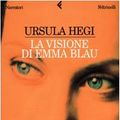
The vision of Emma Blau
Ursula Hegi
Ursula Hegi's The Vision of Emma Blau is an epic story of German immigrants attempting to assimilate while still preserving traces of home in their language and rituals. In 1894 Stefan Blau leaves Europe for America; he is only 13 years old, but he feels the need for another country so strongly that it wakes him up at night. After narrowly escaping a restaurant fire in New York City, he finds himself in New Hampshire. With money he has saved from waiter jobs and poker winnings, he buys a small hotel, which over time he transforms into a six-story, elaborate apartment house. The Wasserburg (water fortress) is a palace towering over a half-empty lake town, standing out in the landscape the same way Stefan's accent stands out in conversation--exotic, awkward, a hybrid of German and American dreams. Hegi's writing is lively and graceful, moving across time, space, and generations without faltering or bogging down. While her scope is vast, her great gift is for particulars: Stefan's third wife, Helene, who has a deep-seated aggression in her soul that her mother attributed to her being a "biter" as a child; his daughter, Greta, who lags in school but notices things no one else does--"the reflection of the half moon that swayed on the water like a slab of frost," or the music of her flute--"long notes that sounded like the calls of large birds flying through the night." These moments of poetry open up The Vision of Emma Blau, halting its swirling world with
Booko found 10 book editions
Product filters
Booko collects this information from user contributions and sources on the internet - it is not a definitive list of editions. Search Booko for other editions of The vision of Emma Blau.



























